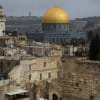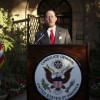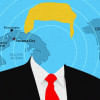Global concern mounts over Trump's Jerusalem plan

Global concern mounted on Wednesday ahead of an announcement by US President Donald Trump to recognise Jerusalem as Israel's capital, with Pope Francis joining a list of leaders warning of the potential for dangerous fallout.
The move by Trump, set to come in a speech later Wednesday, would upend decades of careful US policy and ignore dire warnings of a historic misstep that could trigger a surge of violence in the Middle East.
A senior administration official said Trump would make the announcement at 1:00 pm (1800 GMT) from the White House.
"He will say that the United States government recognises that Jerusalem is the capital of Israel," a senior administration official said, speaking on condition of anonymity.
"He views this as a recognition of reality, both historic reality and modern reality."
Plunging further into a decades-long dispute over a city considered holy by Jews, Muslims and Christians, Trump will also order planning to move the US embassy from Tel Aviv to Jerusalem.
"It will take some time to find a site, to address security concerns, design a new facility, fund a new facility and build it," the official said.
"It will be a matter of some years, it won't be months, it's going to take time."
The status of Jerusalem is a critical issue in the Israeli-Palestinian conflict, with both sides claiming the city as their capital.
In a frantic series of calls, the leaders of Saudi Arabia, Egypt, Jordan, the European Union, France, Germany and Turkey all warned Trump against the move.
Anticipating protests, US government officials and their families have been ordered to avoid Jerusalem's Old City and the West Bank.
Further warnings from world leaders came on Wednesday.
"I cannot silence my deep concern over the situation that has emerged in recent days," Pope Francis said.
"Jerusalem is a unique city, sacred for Jews, Christians and Muslims," he said, a day after speaking by phone with Palestinian president Mahmud Abbas.
The pontiff added that maintaining Jerusalem's status quo was important "in order to avoid adding new elements of tension to an already volatile world that is wracked by so many cruel conflicts".
British foreign minister Boris Johnson, speaking as he arrived for a NATO meeting in Brussels, said "we view the reports that we have heard with concern, because we think that Jerusalem obviously should be part of the final settlement between the Israelis and the Palestinians, a negotiated settlement."
China warned the plan could fuel tensions in the region and Turkey said it risked igniting a "fire" in the Middle East.
President Recep Tayyip Erdogan's spokesman said he had called for a summit of the Organisation of Islamic Cooperation (OIC), the main pan-Islamic body, in Istanbul on December 13 "to display joint action among Islamic countries" over Jerusalem.
Jordan and the Palestinians also called for an emergency meeting of the Arab League in Cairo, with a diplomatic source saying it was likely to be convened on Saturday.
But in a surprise, Israeli Prime Minister Benjamin Netanyahu refrained from commenting on the issue on Wednesday in his first speech since Trump's plan was confirmed.
Trump's move comes close to fulfilling a campaign promise, and will delight his political donors and the conservative and evangelical base so vital for the embattled president.
Most of the international community does not formally recognise Jerusalem as Israel's capital, insisting the issue can only be resolved in final status negotiations.
US officials talk of "threading the needle" -- fulfilling Trump's campaign pledge, while keeping the peace process on the rails.
The White House argues that such a move would not prejudge final talks and would represent the reality that west Jerusalem is and will continue to be part of Israel under any settlement.
"President Trump remains committed to achieving a lasting peace agreement between the Israelis and the Palestinians and is optimistic that peace can be achieved," a second US official said.
Trump "is prepared to support a two-state solution... if agreed to by the two parties."
Critics say Trump's approach could extinguish his own much-vaunted efforts to broker Middle East peace while igniting the flames of conflict in a region already reeling from crises in Lebanon, Syria, Iraq, Yemen and Qatar.
The armed Islamist Hamas movement has threatened to launch a new "intifada" or uprising.
Palestinians were calling for three days of protests starting from Wednesday, raising fears of potential unrest.
Saudi Arabia's King Salman warned his close ally that moving the US embassy was a "dangerous step" that could rile Muslims around the world.
Israel seized the largely Arab eastern sector of Jerusalem during the 1967 Six-Day War and later annexed it, claiming both sides of the city as its capital.
But the Palestinians want the eastern sector as the capital of their future state and fiercely oppose any Israeli attempt to extend sovereignty there.
Trump was pushed to act on the embassy as a result of the 1995 Jerusalem Embassy Act, which stated that the city "should be recognised as the capital of the state of Israel" and that the US embassy should be moved there.
A waiver has been repeatedly invoked by successive US presidents, postponing the move on grounds of "national security" once every six months, meaning the law has never taken effect.
Several peace plans have unravelled in the past decades over the issue of how to divide sovereignty or oversee holy sites in Jerusalem, with questions over the status of the city repeatedly sparking anger on both sides of the conflict.

 For all latest news, follow The Daily Star's Google News channel.
For all latest news, follow The Daily Star's Google News channel. 








Comments